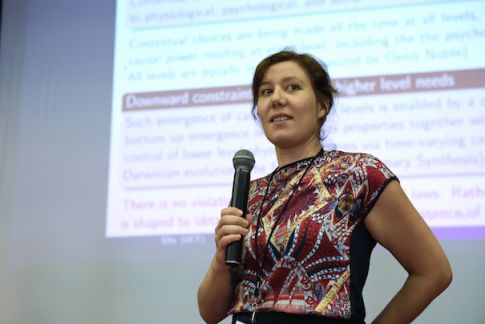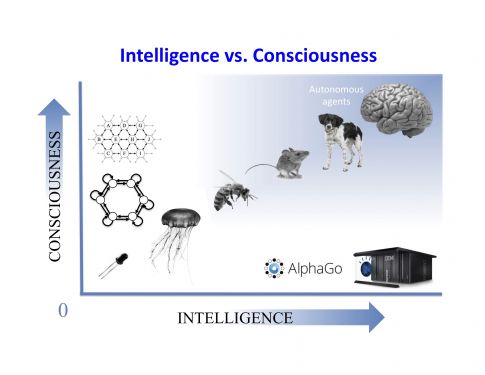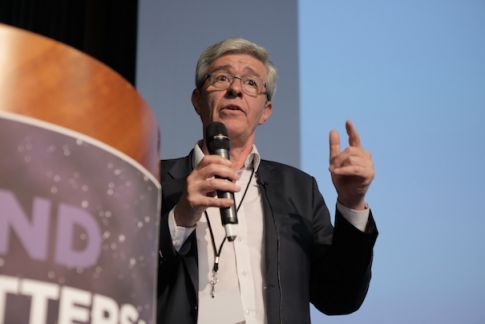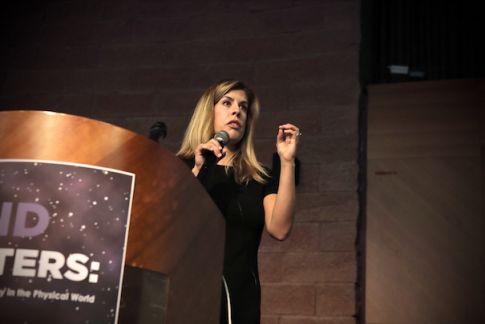There has been quite a bit of discussion surrounding my recent blog post about my talk on free will at the 6th FQXi conference this past July. In my work I am merely attempting to mathematically model the behavior that we most often associate with free will and agency. But what is agency? Is there room for free will within physics?
As Carlo Rovelli noted in his talk, there is a tension between decision and action within physics. It doesn't help that agency, which involves both decisions and actions, is treated differently by different physicists. Rovelli believes that an agent should be describable within any theory of description and that no new physics is needed. Clearly he is not a dualist. Yet he also says that we should define agency as whatever happens in the cases in which someone, i.e. the agent, makes a decision.
But what is an agent? According to Susanne Still, they are observers that act on their environment: they sense, process information, and act. To Still, the description of decision making as an optimization process, or any such utilitarian approach, is fraught with problems. What we really want is a theory where behaviors emerge from first principles. These principles should, in turn, reflect physical reality. In other words, physics limits what can actually happen, i.e. there are physical limits to what agents can do (environmental forcing, context, etc.), and thus a complete theory of agency needs to take these limits into account. But agency also involves intention or purpose which begs the question, asked by Larissa Albantakis: how can we distinguish autonomous actions from mere reflexes?

Larissa Albantakis
This is something I considered in my talk on free will. At some point our choices are made so quickly that we don't even think about them and are therefore merely reflexive.
Albantakis' answer to this question is to define an autonomous agent as being an open system that is stable and that has self-defined and self-maintained borders. Such a system also has the capacity to perform actions that are at least partially caused from within, i.e. states internal to the system can produce causal change. This, of course, begs the question, how do we identify these self-defined borders? This is done by tracing back through the causal chain and looking at the evolutionary environments associated with each step in the chain. In other words, it involves finding the actual causes of actions. In doing so it is possible to compare levels of consciousness to levels of intelligence (slides and video of Albantakis' talk will appear here). In looking at the representative plot, what is most interesting is what is not on the main sequence such as AI (more intelligent, less conscious) and complex microorganisms (less intelligent, more conscious).

Consciousness versus intelligence from Larissa Albantakis' talk
[youtube:f9wwcLBjrV0, 560, 315]
At any rate, I find it interesting that there is a convergence of ideas happening here towards the language of statistical mechanics and thermodynamics. Rovelli suggests that agency is related to entropy growth, Still argues that thermodynamics places physical constraints on agency, Albantakis defines autonomous agents in terms of open systems, Karl Friston spoke of Markov blankets, and I develop a measure of free will (i.e. agency) in terms of statistical distributions.

Karl Friston
In a certain sense, this is perhaps not surprising given the close relationship between statistical mechanics, thermodynamics, and information processing. But is this convergence more than merely one of language? Can agency, intention, and purpose be adequately described in terms of statistics and information? Various speakers at the conference had widely diverging opinions on this. Alyssa Ney, for instance, generally defended physicalism which puts physics in a privileged place amongst the sciences.

Alyssa Ney
This view appears, at least on the surface, to be heavily reductionist. This can be contrasted with George Ellis' view which suggests that we require a new language since the language of physicalism seems to be mostly reductionist and the world simply can't be fully described in reductionist terms. During one of the panel sessions, Paavo Pylkaanan flatly claimed that physics cannot adequately describe the mind, at least not without new physics. Like Ellis (and unlike Ney), Pylkaanan does not believe that there necessarily is a fundamental level, let alone that physics represents it. By this argument, no field by itself can fully represent or capture the mind (see the debate over this here). It seems clear from this that this debate is likely to endure without some convincing empirical evidence that favors one view over another.